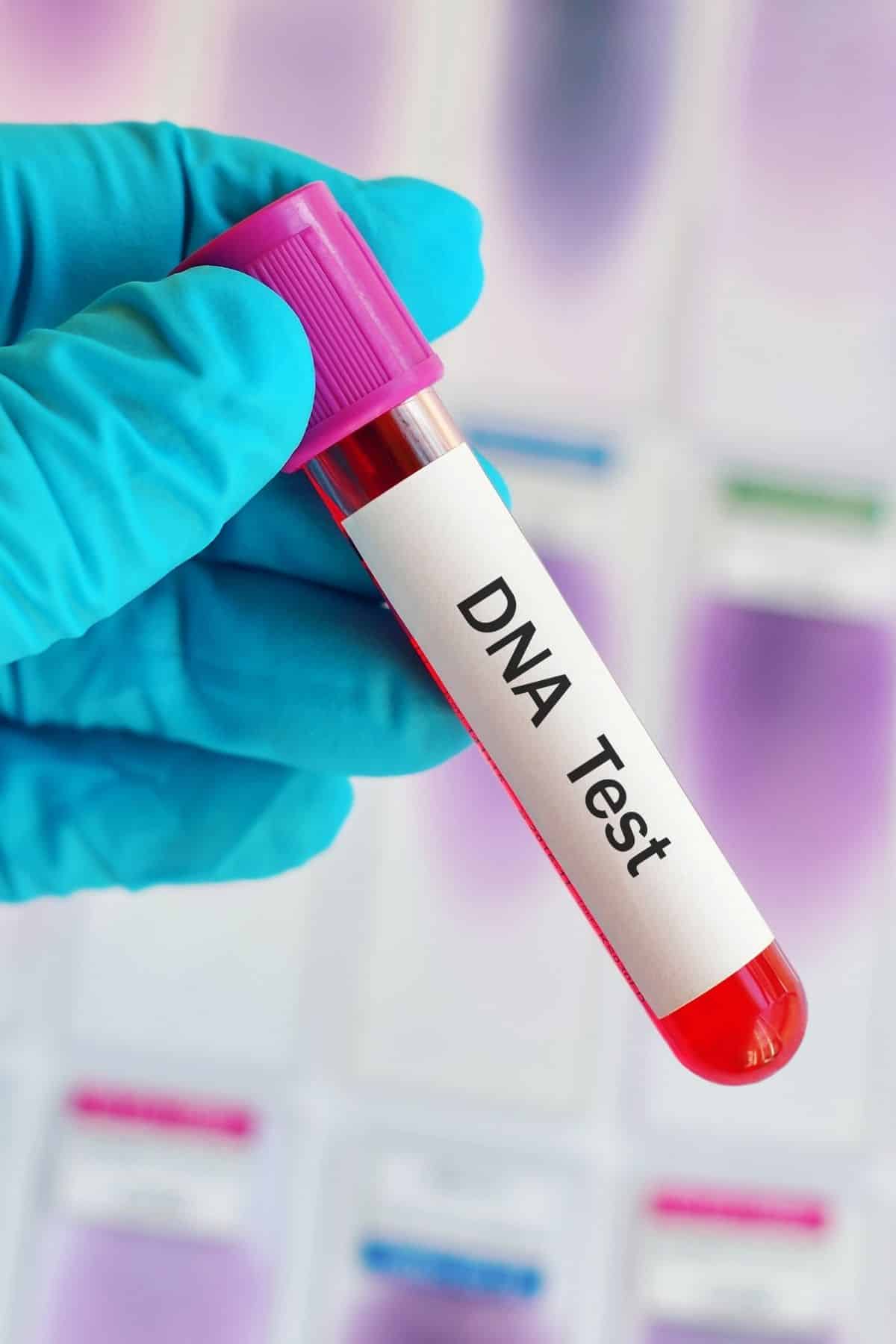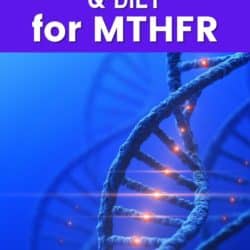MTHFR Diet, Lifestyle, & Supplements (Beginner’s Guide)
If you have one of the common variants of the MTHFR gene, then you may be at higher risk of increased homocysteine and other related disorders. Learn more about the best MTHFR diet, plus other lifestyle and supplement tips.

What is MTHFR?
MTHFR, or methylenetetrahydrofolate reductase, is a gene involved with the conversion of amino acids.
There are two variants of the MTHFR gene that provide instructions for the conversion of these amino acids, including the conversion of Vitamin B9, or folate. This vitamin needs to be converted to a usable form for your bloodstream, so it can then convert homocysteine into methionine for use in protein creation.
While MTHFR is a gene we all have, most people reference the C677T variant. This genetic mutation variant of the MTHFR gene can cause poor methylation. This means that people with this variant are not easily able to convert folate to 5-methyltetrahydrofolate.
Without successful conversion of folate, these people are less likely to convert homocysteine to methionine.
This means that people with poor methylation are more likely to have elevated or high homocysteine levels, among other issues like an increased risk of having children with neural tube defects. Other health conditions resulting from the MTHFR enzyme include insulin resistance and oxidative stress from not getting enough folate.

Do You Have the Gene?
Opinions vary on this, but it’s estimated that as much as 40% of the population has the C677T variant of the MTHFR gene. That means that nearly half the population has poor methylation of folate (folate metabolism) and elevated homocysteine levels.
There is some ethnic correlation with the mutation, but that is not a reliable marker. Rather, you may want to get tested if you have a relative with the mutation, a relative with early-onset thrombosis/cardiovascular disease, or other diseases associated with elevated homocysteine.
You may also want to get tested if you have any of the disorders associated with the MTHFR gene.
A mutated MTHFR gene may be associated with disorders and health issues like schizophrenia, ADHD, depression/anxiety, autism, autoimmune disease, autoimmune disorders, so it’s best to get tested if you have any of those.
Anyone can get tested through a simple blood test or genetic testing DNA analysis.
Best MTHFR Diet, Supplement, & Lifestyle Tips
If you’ve tested positive for the MTHFR mutation, you can still support your long term health with a few simple lifestyle changes.
Here are five things to know if you have MTHFR, plus more information about MTHFR diet and lifestyle tips.
1. Test your homocysteine
Since the successful conversion of folate is necessary for the conversion of homocysteine to methionine, elevated homocysteine levels can indicate a deficient folate status. Have your doctor test your homocysteine levels to provide some insight into your folate levels.
If your doctor won’t order the test, you can order it yourself! Learn more about how to order your own lab tests from home. You’ll want to know if you have high homocysteine levels that could result from a folate deficiency.
2. Pick the right supplement
Folic acid is the synthetic form of folate. Because folic acid is cheaper than actual folate, many vitamin manufacturers use this form of vitamin B. Unfortunately, folic acid needs to be converted into folate, which is then converted to 5-methyltetrahydrofolate.
For individuals with the MTHFR mutation, folic acid conversion is another step that their bodies are ill-equipped to handle. In this case, it’s best to avoid folic acid supplements and instead opt for methyl folate (or folinic acid if you are sensitive).
Look for supplements with methylated B vitamins (they may also be advertised as “active”). Some good choices include: Pure Encapsulations B-Complex Plus or Pure Encapsulations O.N.E Multivitamin.
3. Eat lots of green leafy vegetables
Dark leafy greens are some of the best sources of folate. Load your plate with whole foods and in particular veggies like kale, chard, bok choy, spinach, and collard greens. See my list of the best green vegetables. You can also get folate from microgreens!
Other food sources of folate include beef liver, beans and legumes, and avocado.
Some recipes that are high in natural folate include my Chocolate Avocado Pudding, Swiss Chard Smoothie, Collard Green Smoothie, or Green Apple Smoothie with Spinach.
Even if you have a picky eater at home, it is possible to get them to eat vegetables. See all my tips for the best vegetables for picky eaters.

4. Avoid enriched and fortified foods
Many countries including the United States and Canada request manufacturers to add vitamins to their foods. This requirement started in the 1940s when iodine was added to salt to help prevent goiters in the United States.
Since then, many manufacturers have added synthetic vitamins and minerals to a long list of foods including flours, breads, cereals, and milk. One of these synthetic vitamins is folic acid.
This fortification of foods with folic acid can be a problem for people following an MTHFR diet. Too much folic acid can also lead to vitamin B12 deficiency.
The only way to avoid enriched or fortified foods is to read the ingredient labels. You will see the name of the vitamin or mineral on the ingredient list. Try to find unfortified alternatives.
5. Beware of supplementing too fast
Start slowly to re-start methylation. Once you’ve found a methylated supplement that you’d like to begin taking, be sure to slowly introduce it.
Supplementing too quickly can lead to hypermethylation, which is linked to DNA damage.
6. Watch for additional symptoms
Once you start supplementing with methyl folate or you greatly increase your intake of folate-rich foods, watch for symptoms of overmethylation including anxiety and agitation.
Hypermethylation can cause issues like these, so be sure to go slowly and work with a practitioner to continuously test your levels.
It’s really best to work with a qualified healthcare practitioner when you are dealing with these root cause issues including poor methylation.
MTHFR Diet and Lifestyle FAQs
There is no set diet recommended for someone with an MTHFR gene mutation, as medical history and bio-individuality must be considered.
Work with a practitioner to determine the best diet for you.
In general, people with the MTHFR mutation want to consider the following in their diets:
Include an abundance of folate-rich foods like animal and plant proteins, leafy greens, banana, and avocado.
Remove foods fortified with synthetic folic acid, like breakfast cereals and other processed foods.
Limit foods high in methionine if your homocysteine levels are elevated. These foods include egg whites, some seafood, and many animal proteins.
An MTHFR deficiency can result in a genetic condition known as homocystinuria. This is due to a lack of folate. This condition is commonly caught during newborn screenings. Proper treatment prevents its effect on a child’s life. If left untreated, however, it can lead to developmental delays and disabilities.
As with diet, there are no set recommendations for supplements needed with an MTHFR gene mutation. It’s best to get your vitamin and mineral levels tested before beginning any supplementation and ask your healthcare provider before starting any new ones.
However, here are some commonly required supplements for those with MTHFR gene defects:
1. Methylated B vitamins to promote methylation and optimal folate levels.
2. N-Acetyl-Cysteine, milk thistle, glutathione, and antioxidants to promote healthy detoxification.
3. High quality methylated prenatal vitamin for women trying to conceive or already pregnant or breastfeeding.
See my related post on the What Vitamins Should a 30 Year Old Woman Take?
It is uncertain whether or not MTHFR variants can lead to depression. MTHFR mutations are correlated with several psychiatric disorders, but this is just a correlation.
It’s important to note that in all the correlations between MTHFR polymorphism and depression, other factors such as childhood trauma and poor nutrition were also present.
It is not necessary for all women to take methyl folate as opposed to folic acid. Women with the MTHFR mutation should opt for methyl folate instead of folic acid.
A woman without the mutation should not need to unless she could become pregnant or was already pregnant. This is because pregnant women need higher levels of folate to ensure a healthy pregnancy and baby; taking the active form ensures less of the vitamin is lost in the conversion.

More Health Articles You Might Like
- Best Supplements to Reduce Estrogen Dominance
- Ten Best Vitamins for Women Over 50
- Different Types of Magnesium (How to Choose)
- Tips for Starting a Gluten-Free and Dairy-Free Diet
Or, see all my articles on Women’s Health.
Additional Best Diet Articles
Conclusions
It’s important to know whether or not you have the MTHFR gene variant which may affect your folate and homocysteine status. Consider supplementing with methylated folate, and be sure to consume plenty of folate-rich foods to help your body’s ability to handle folate absorption, do the methylation process, and lower your homocysteine.
Don’t forget to join my newsletter list to get exclusive clean eating recipes and tips. The newsletter is 100% free with no spam; unsubscribe anytime.
About the Author: Carrie Forrest has a master’s degree in public health with a specialty in nutrition. She is a top wellness and food blogger with over 5 million annual visitors to her site. Carrie has an incredible story of recovery from chronic illness and is passionate about helping other women transform their health. Send Carrie a message through her contact form.
Note: this post is for informational purposes only and is not intended as medical advice. Please consult your healthcare provider for recommendations related to your individual situation.






















Hi there! Do you have specific brands of vitamins you’d recommend? There are so many out there, and it’s hard to figure out what’s best for MTHFR. Thanks!
I love Pure Encapsulations. I also use Jarrow and a brand called Seeking Health. 🙂